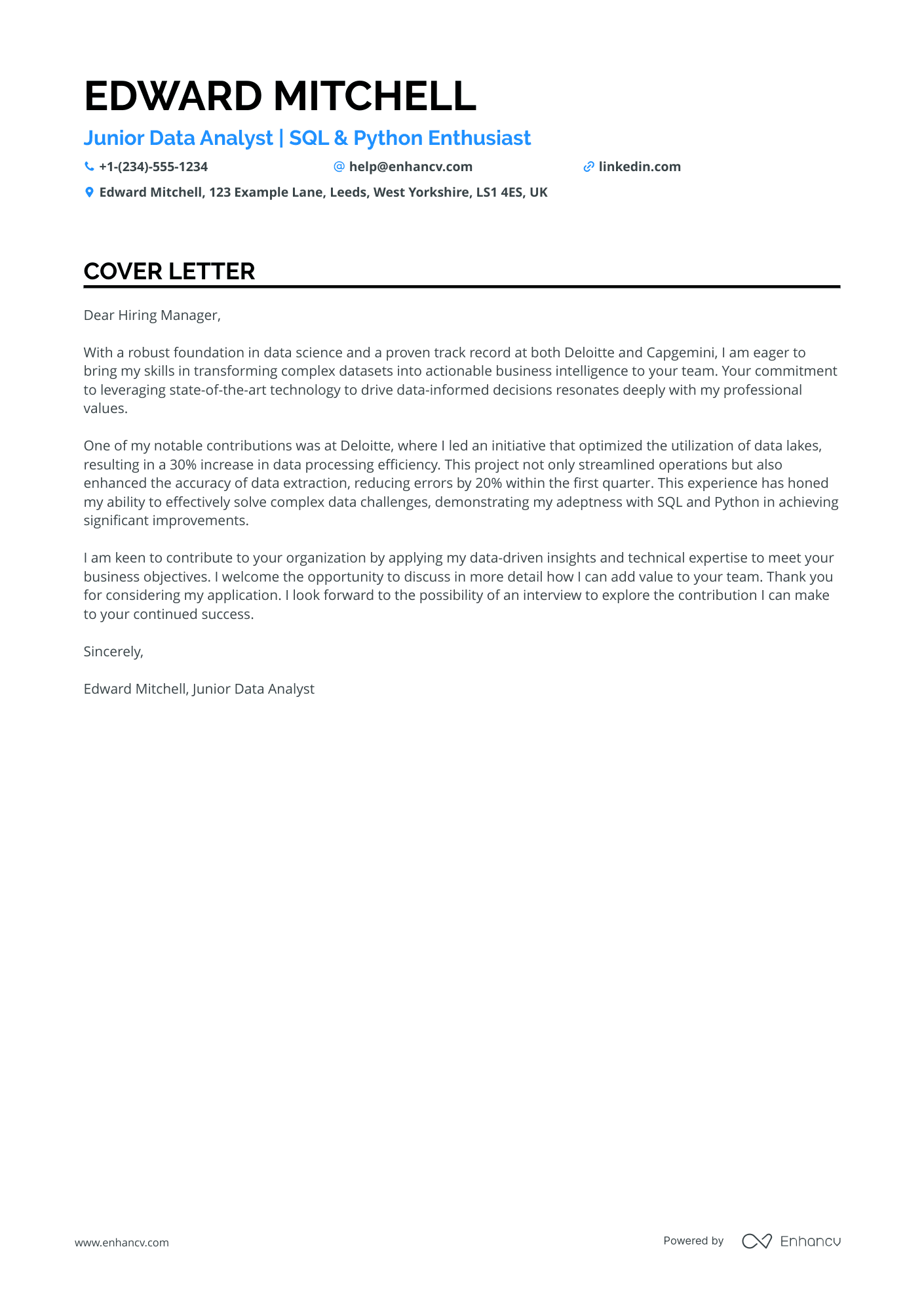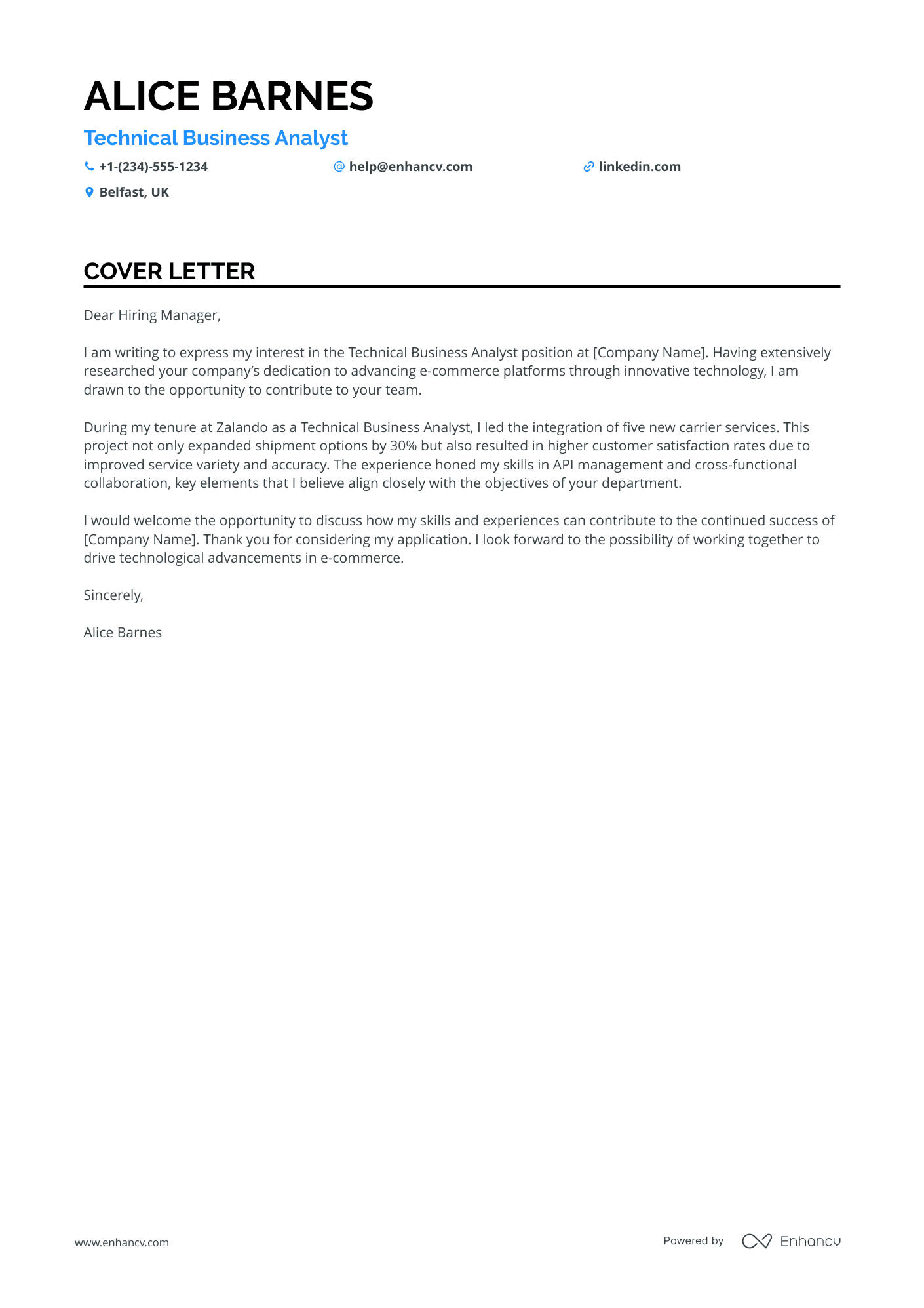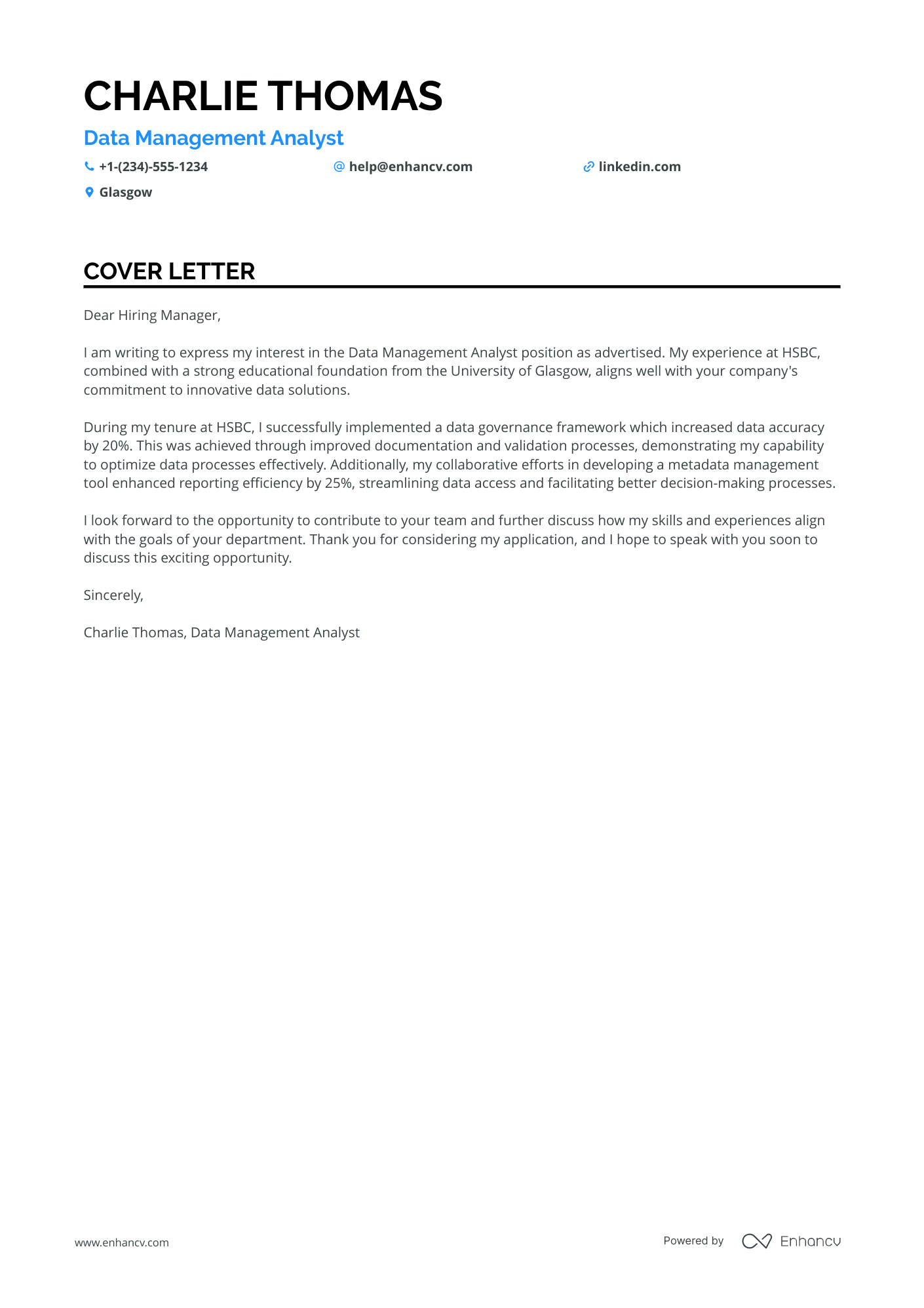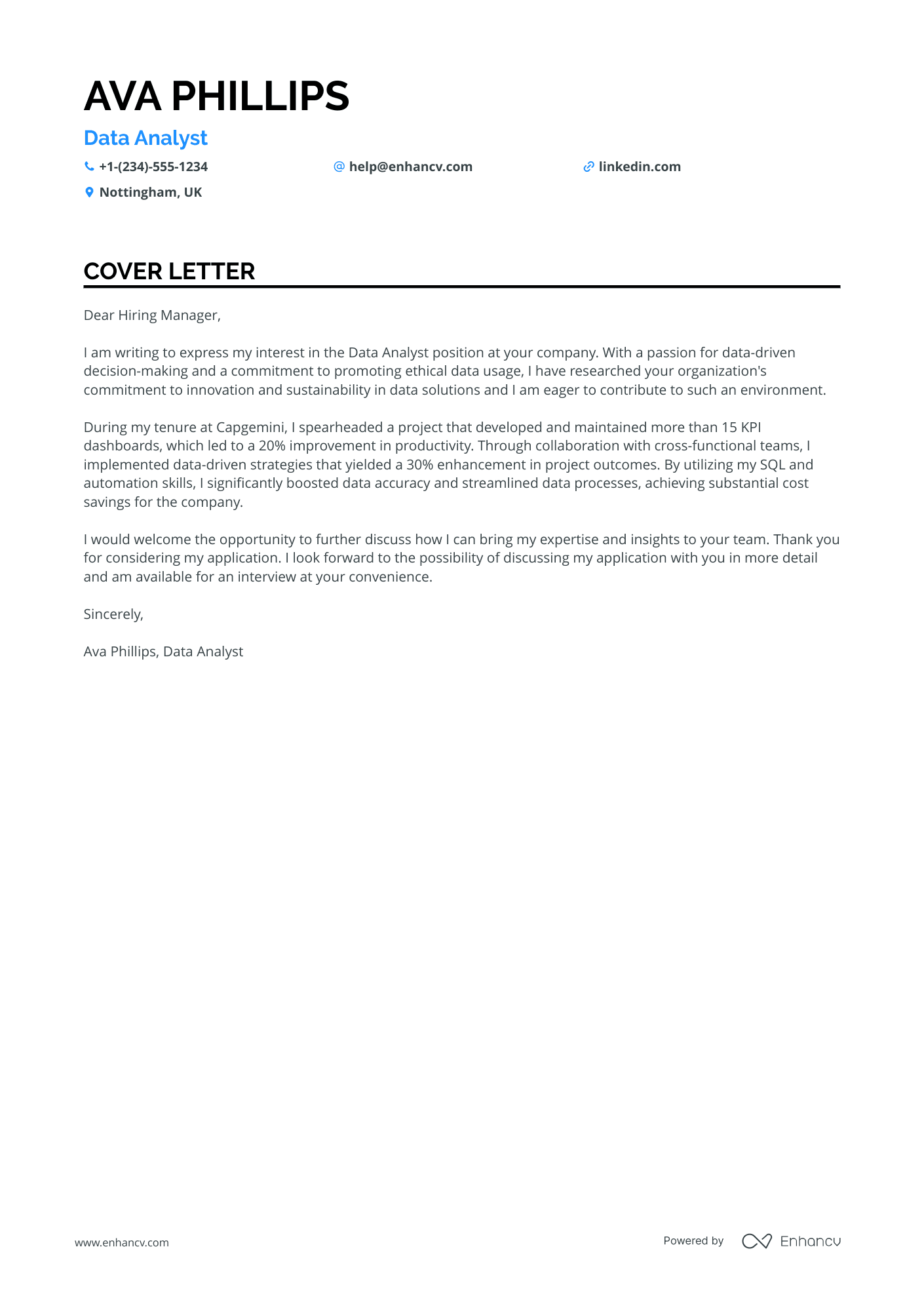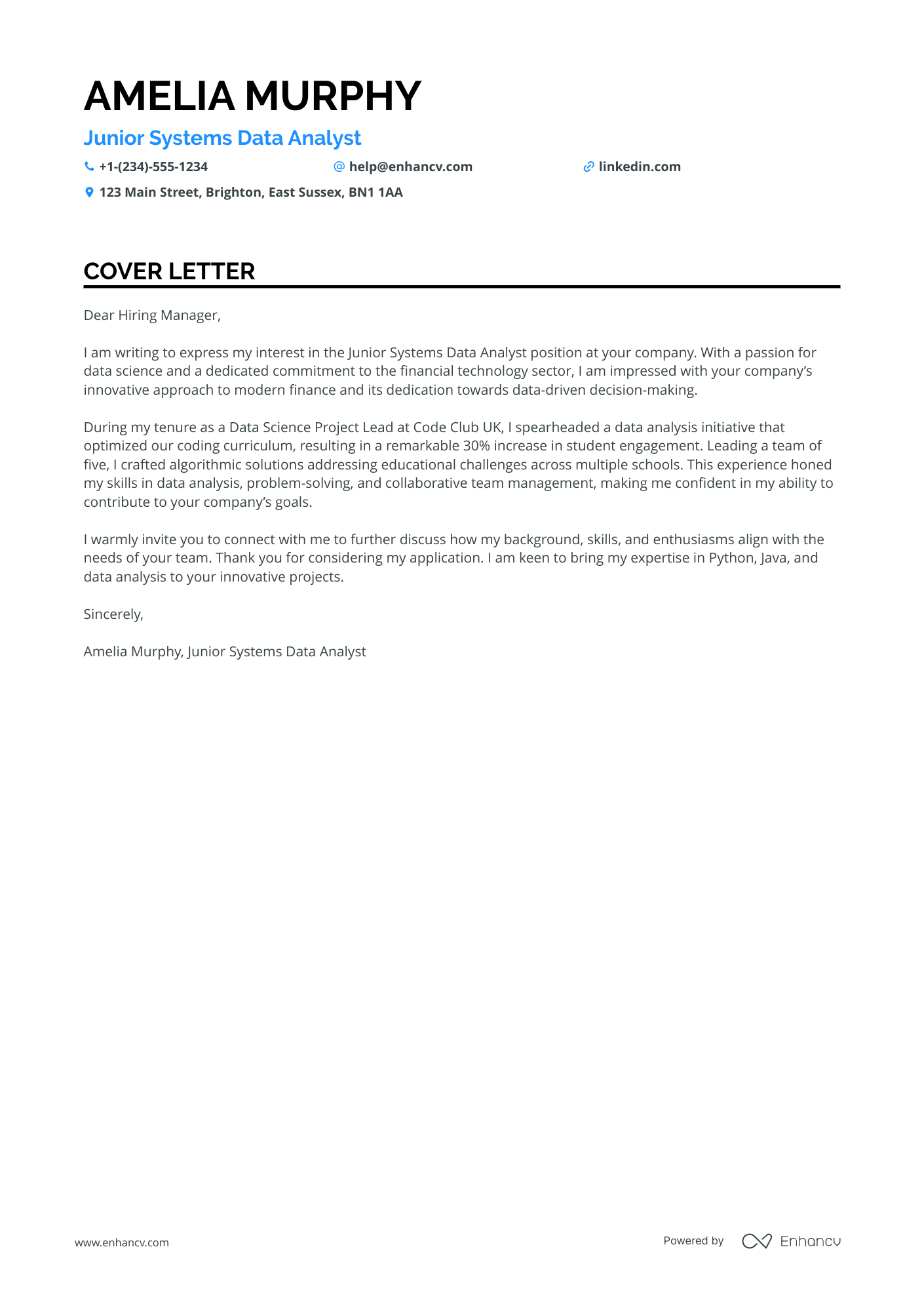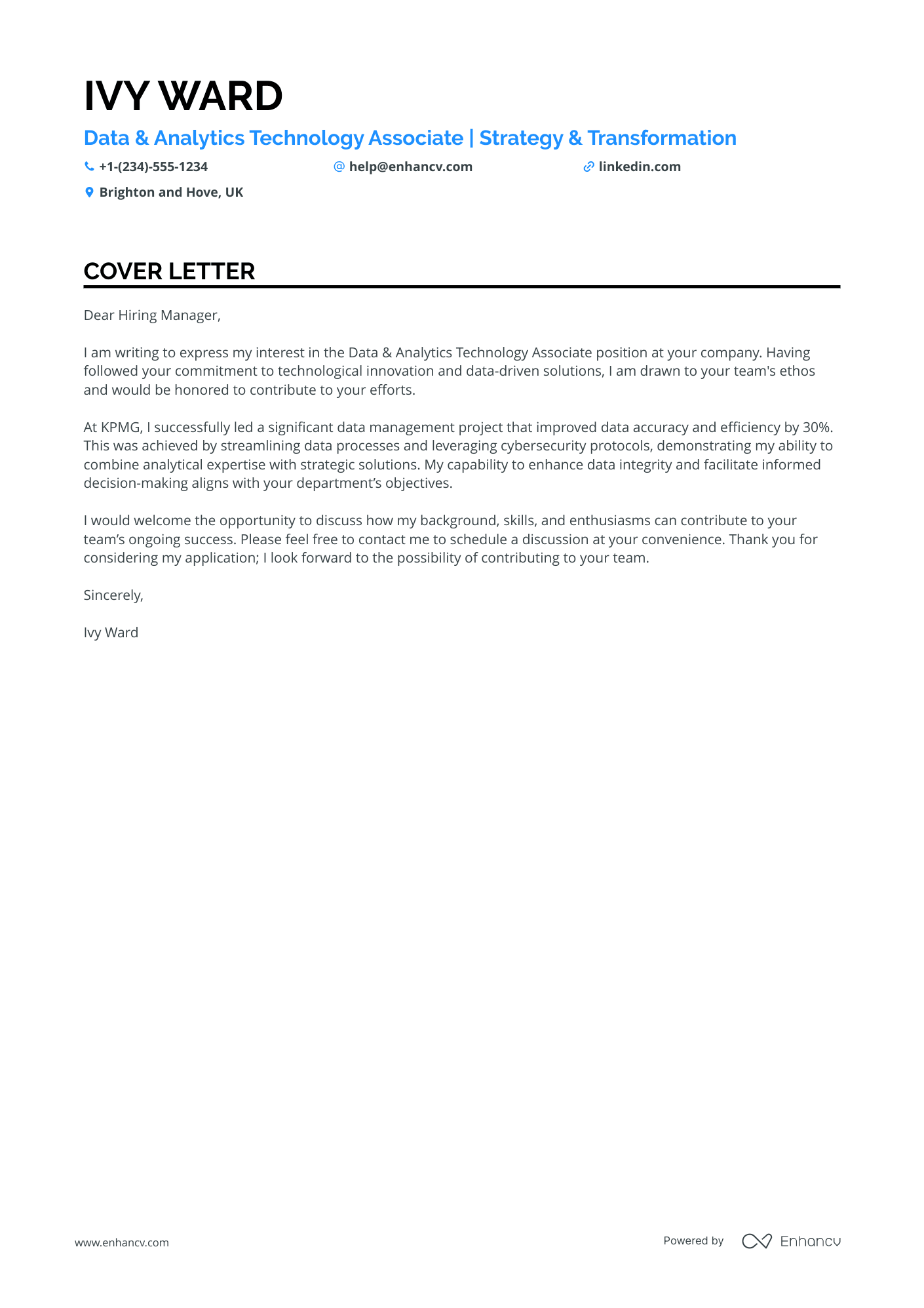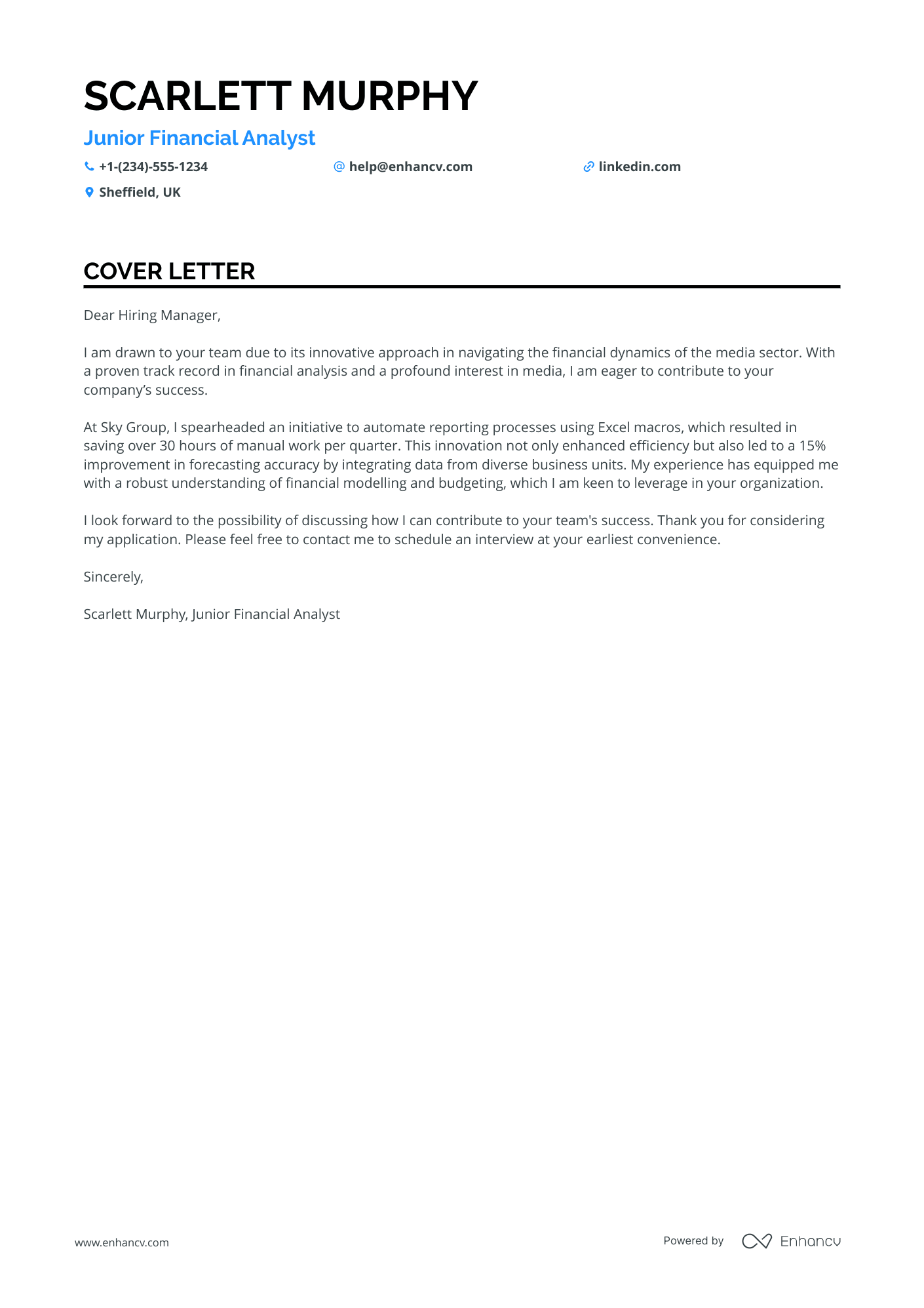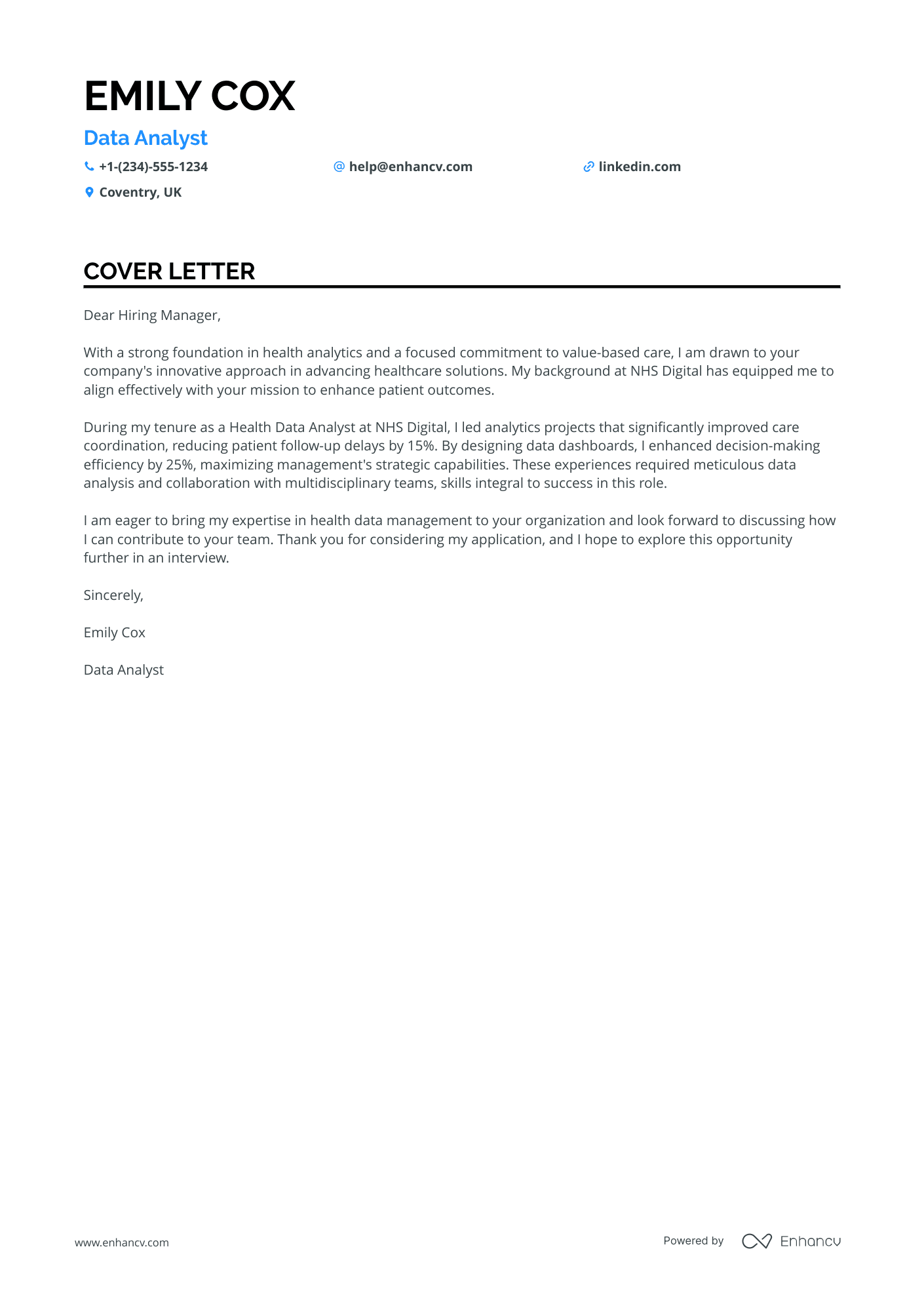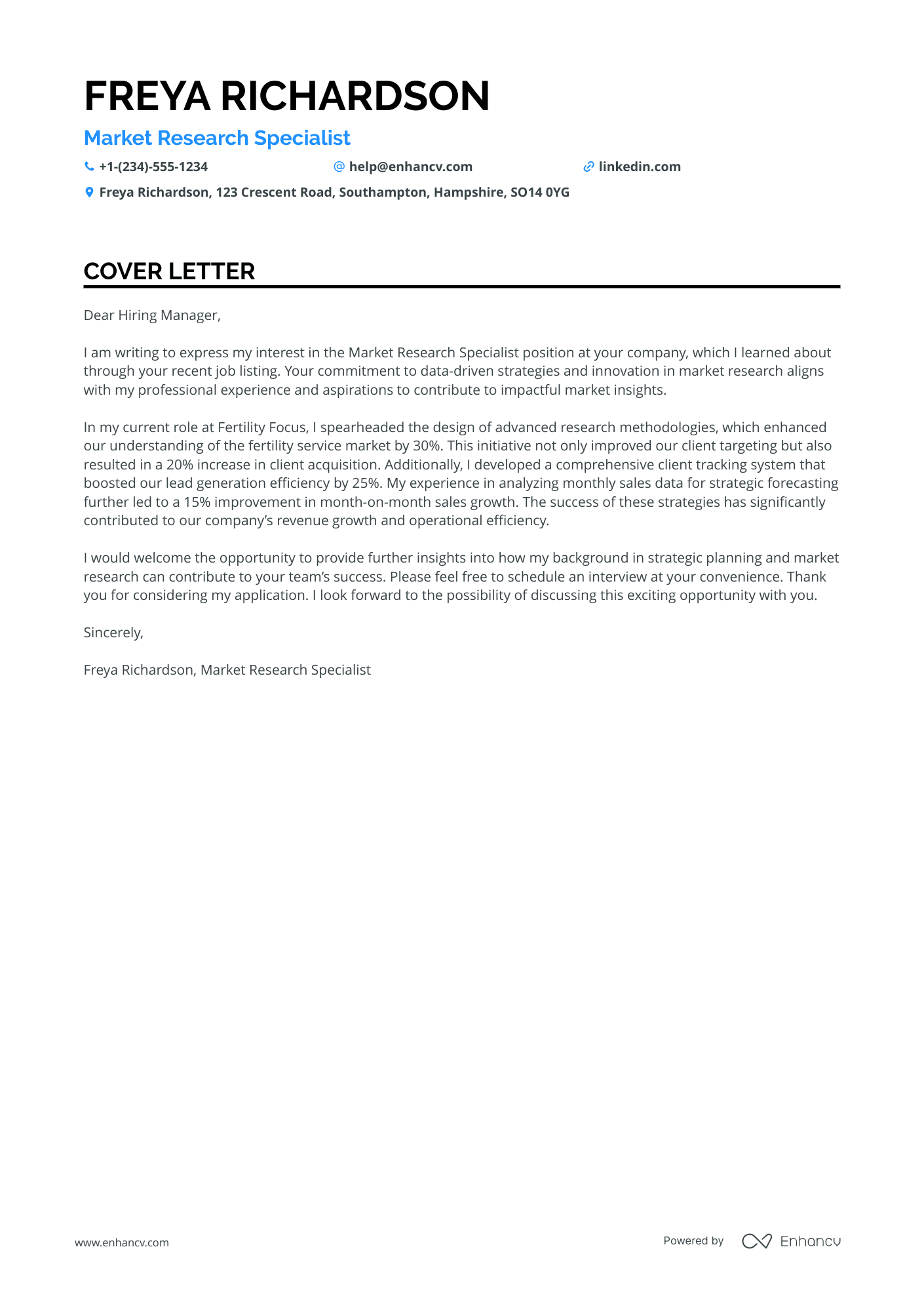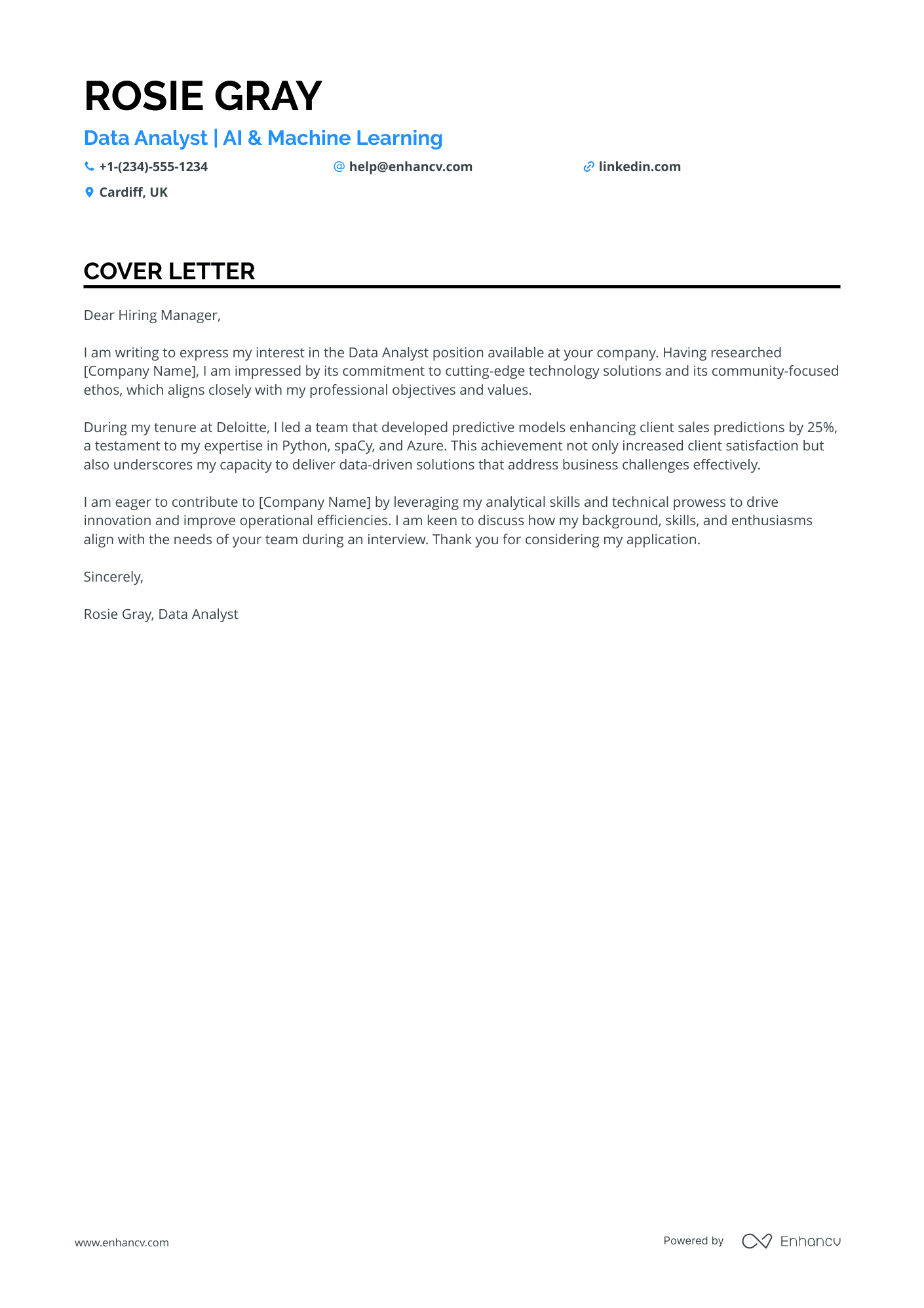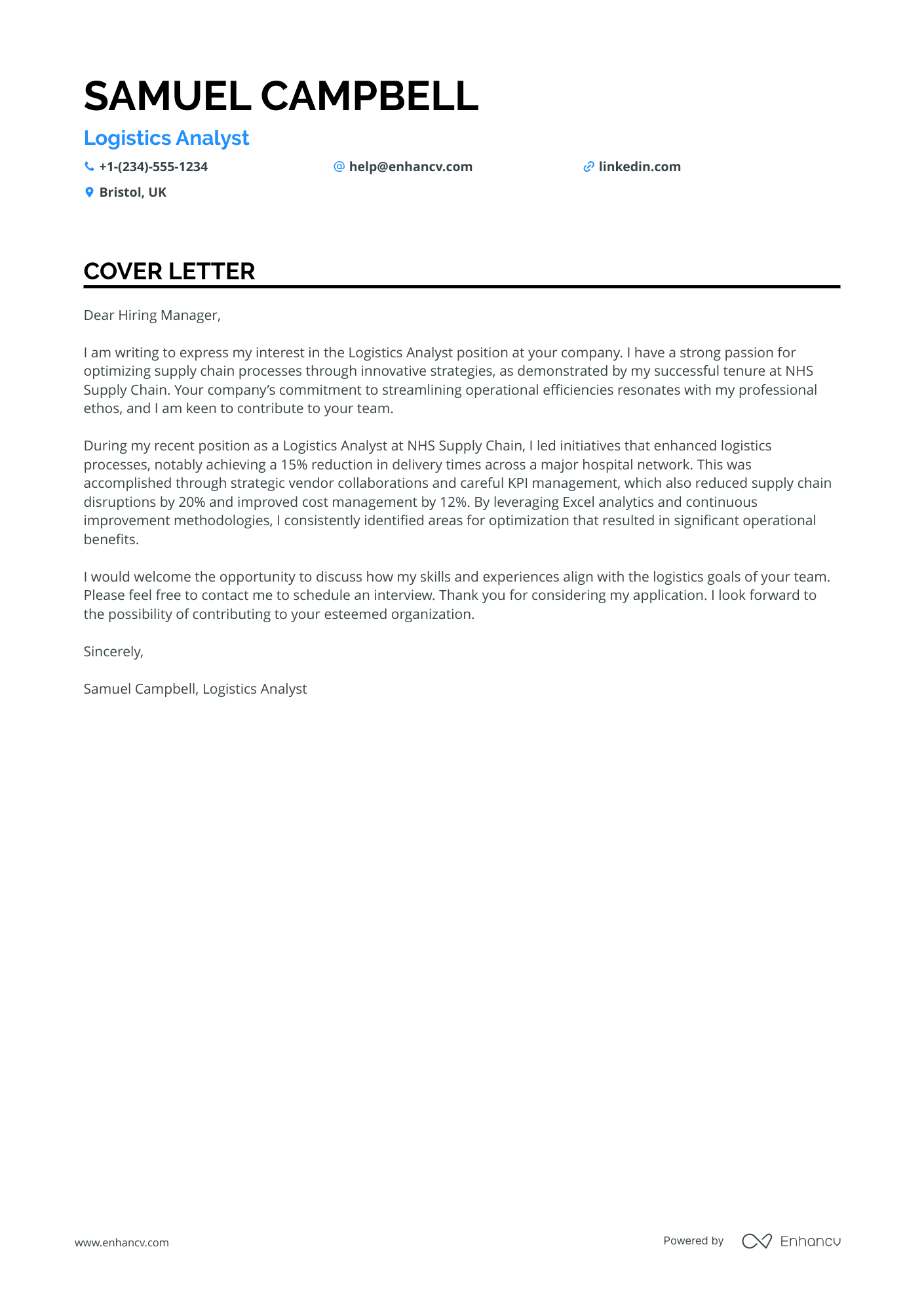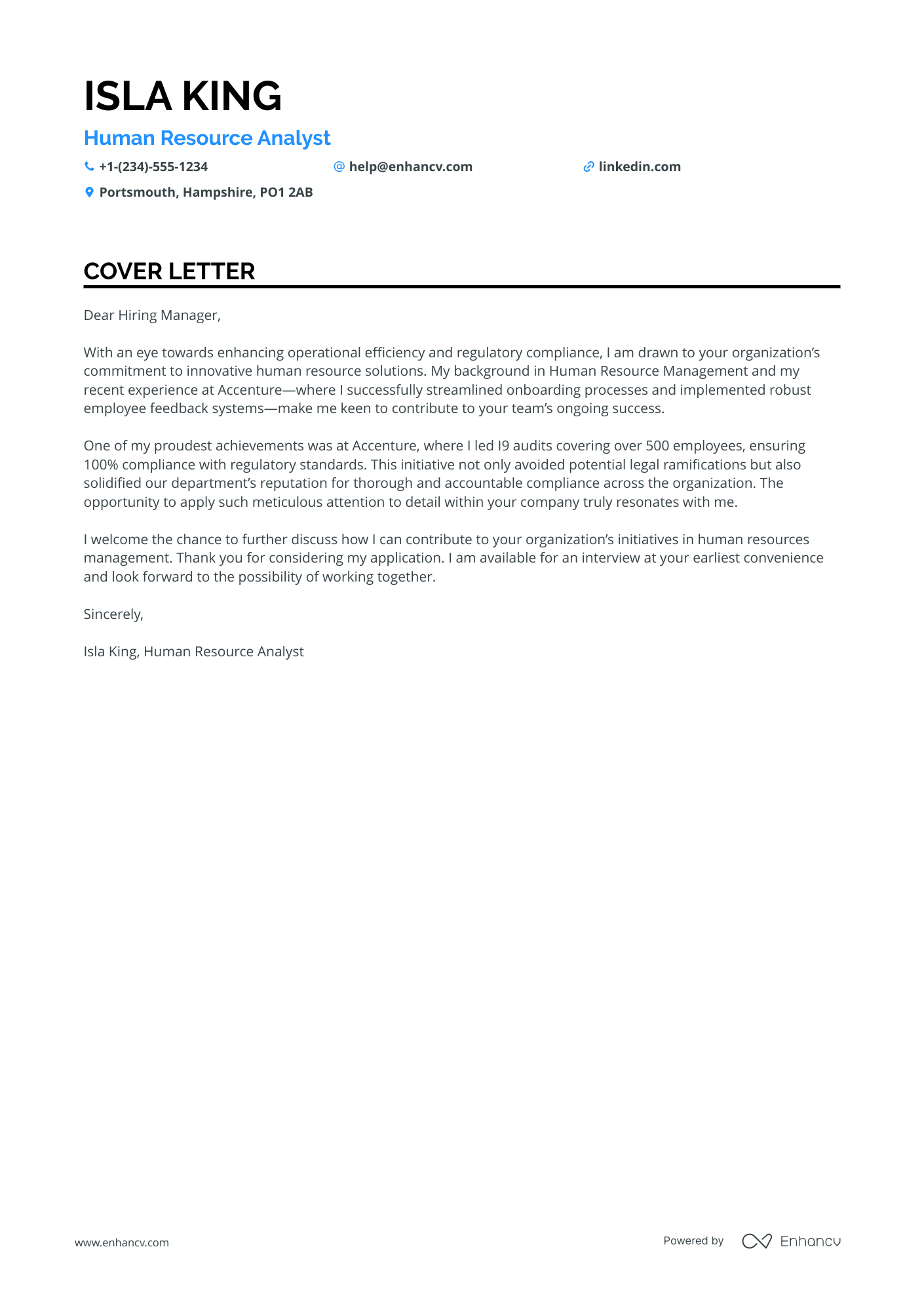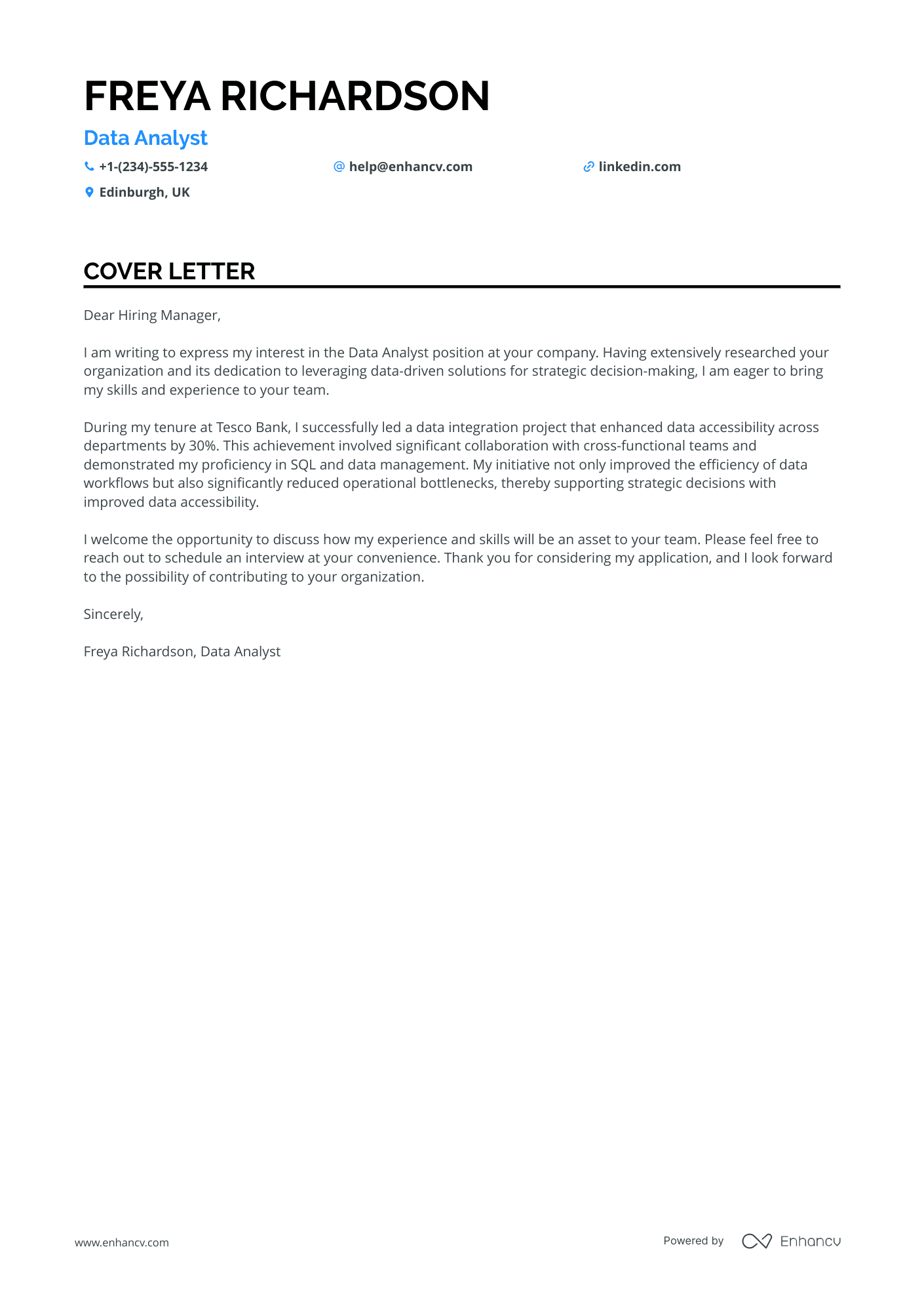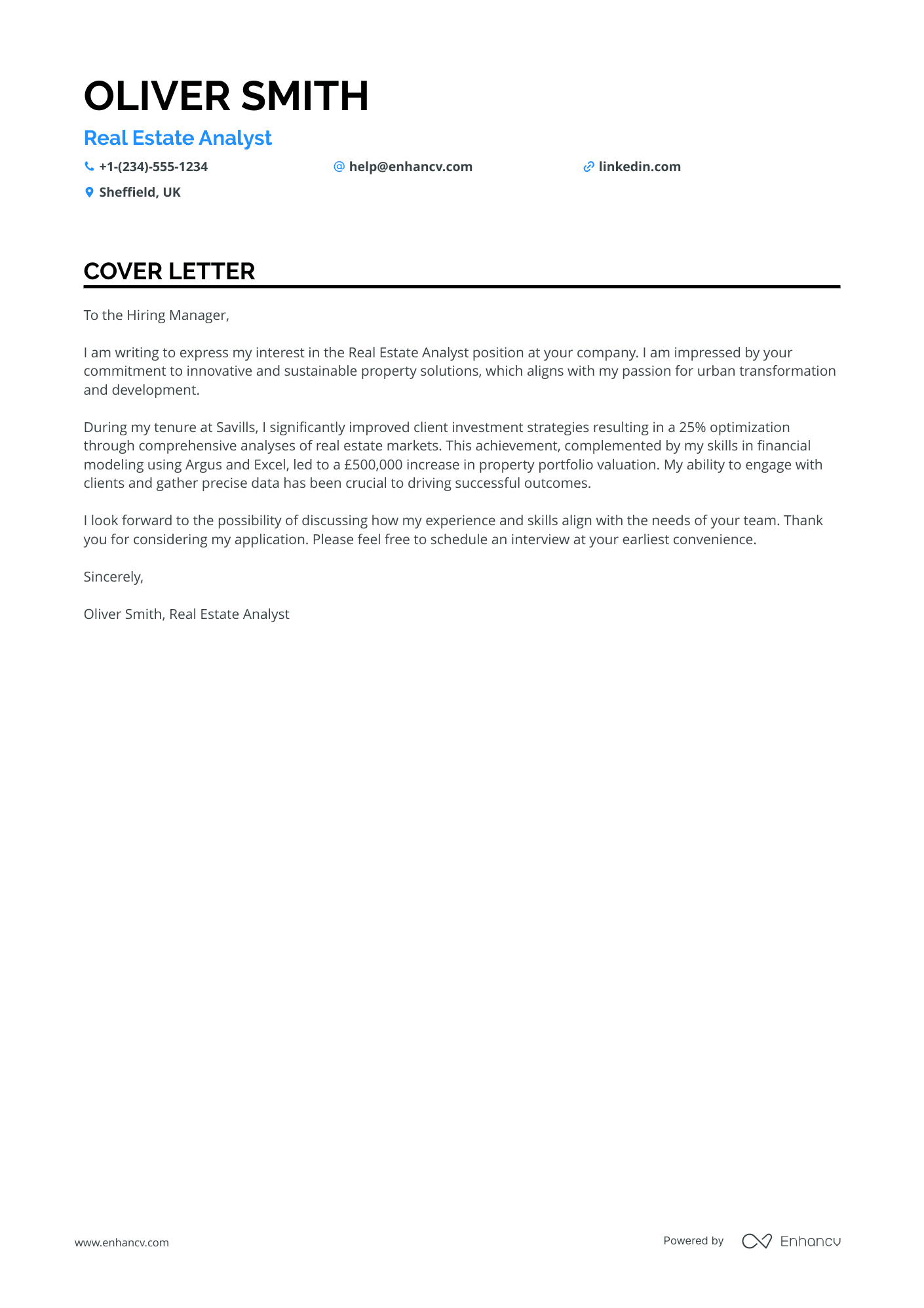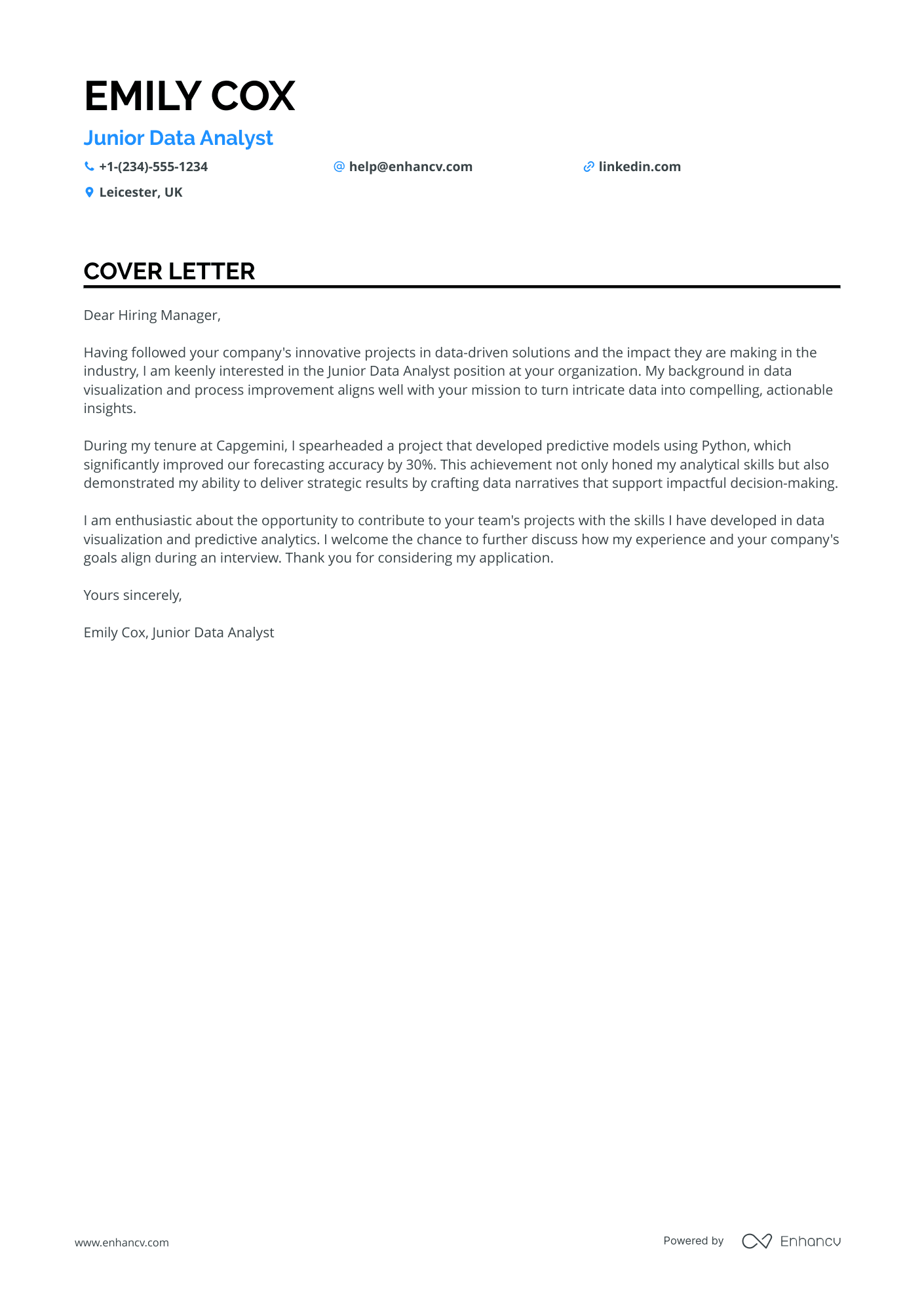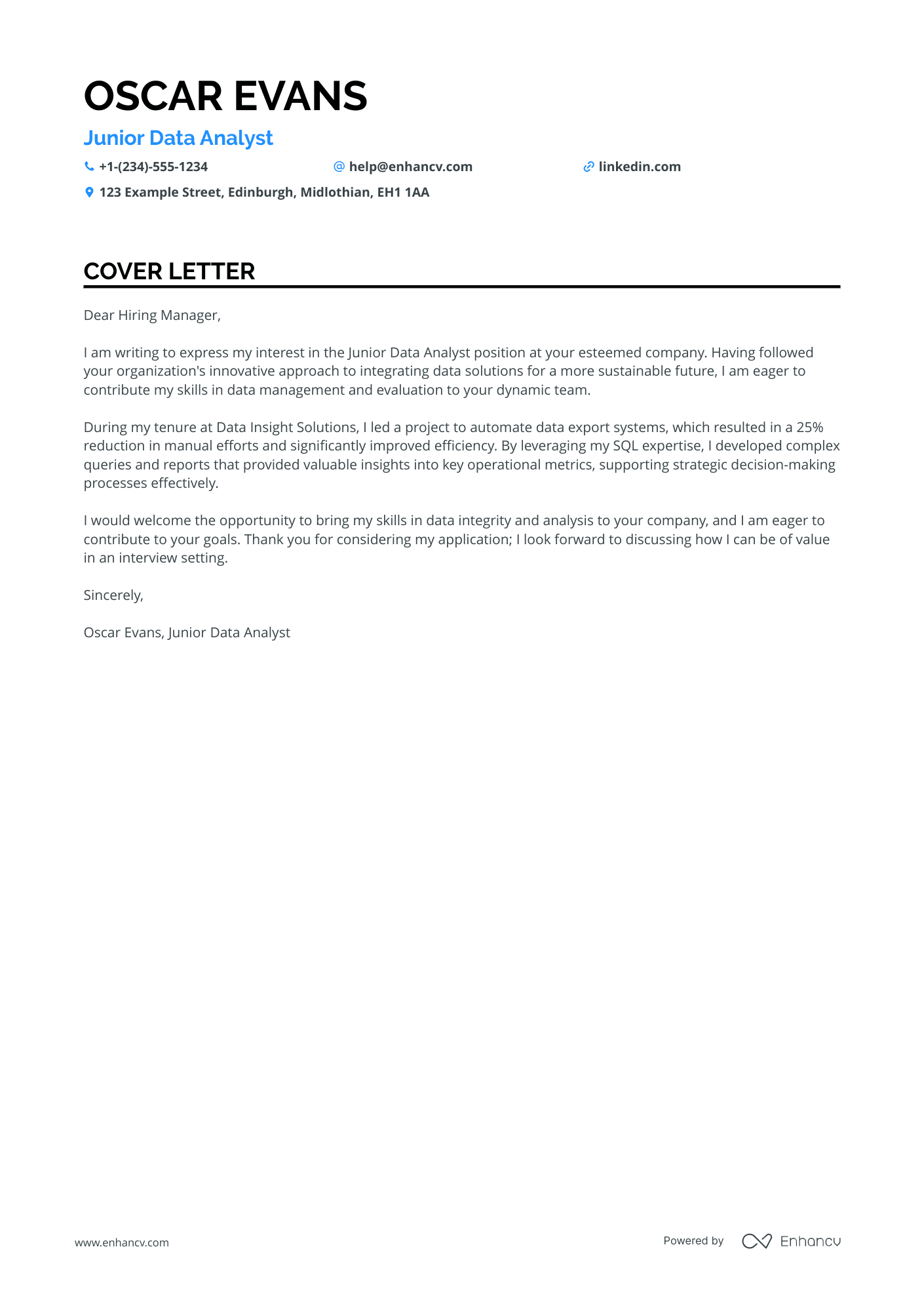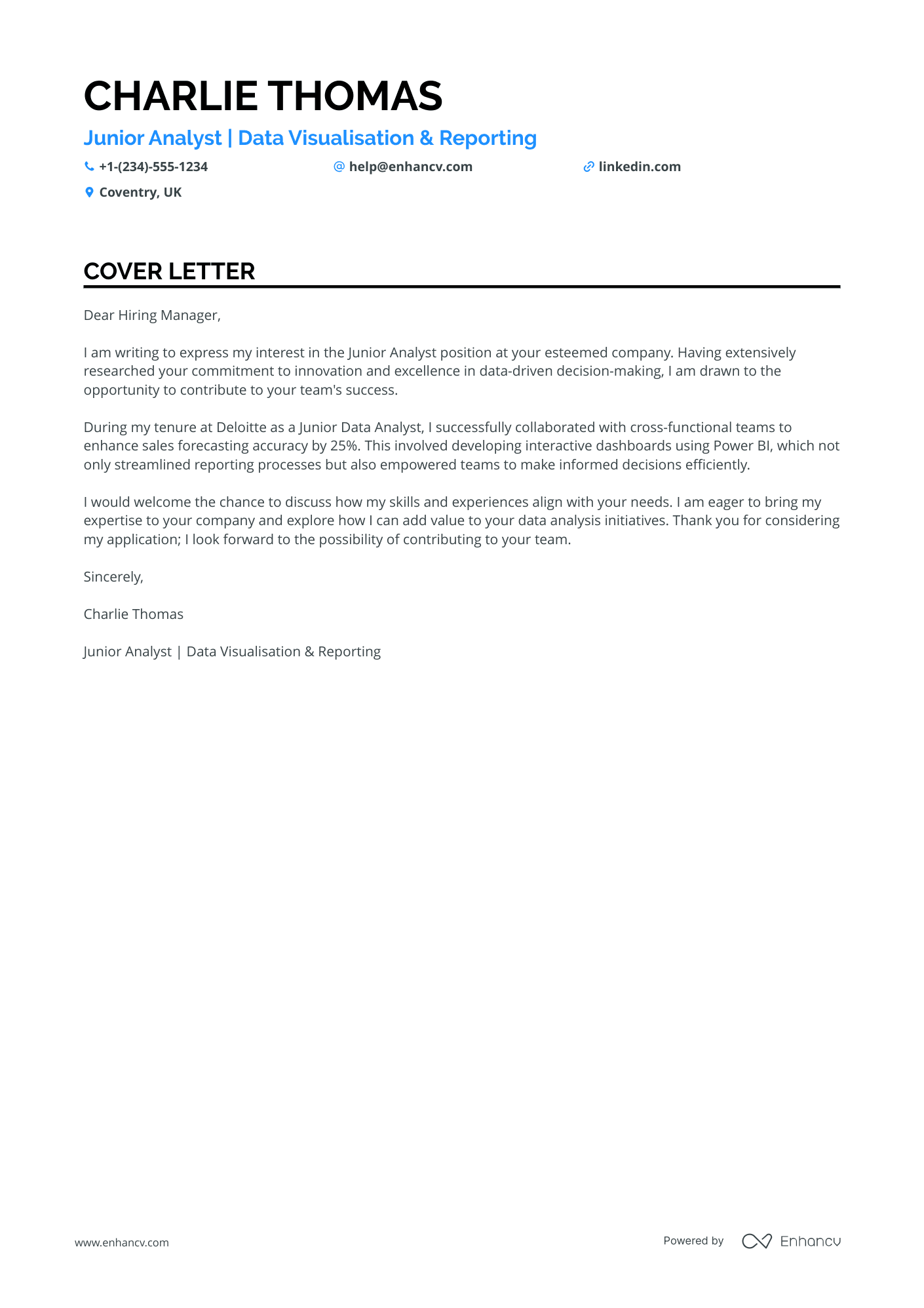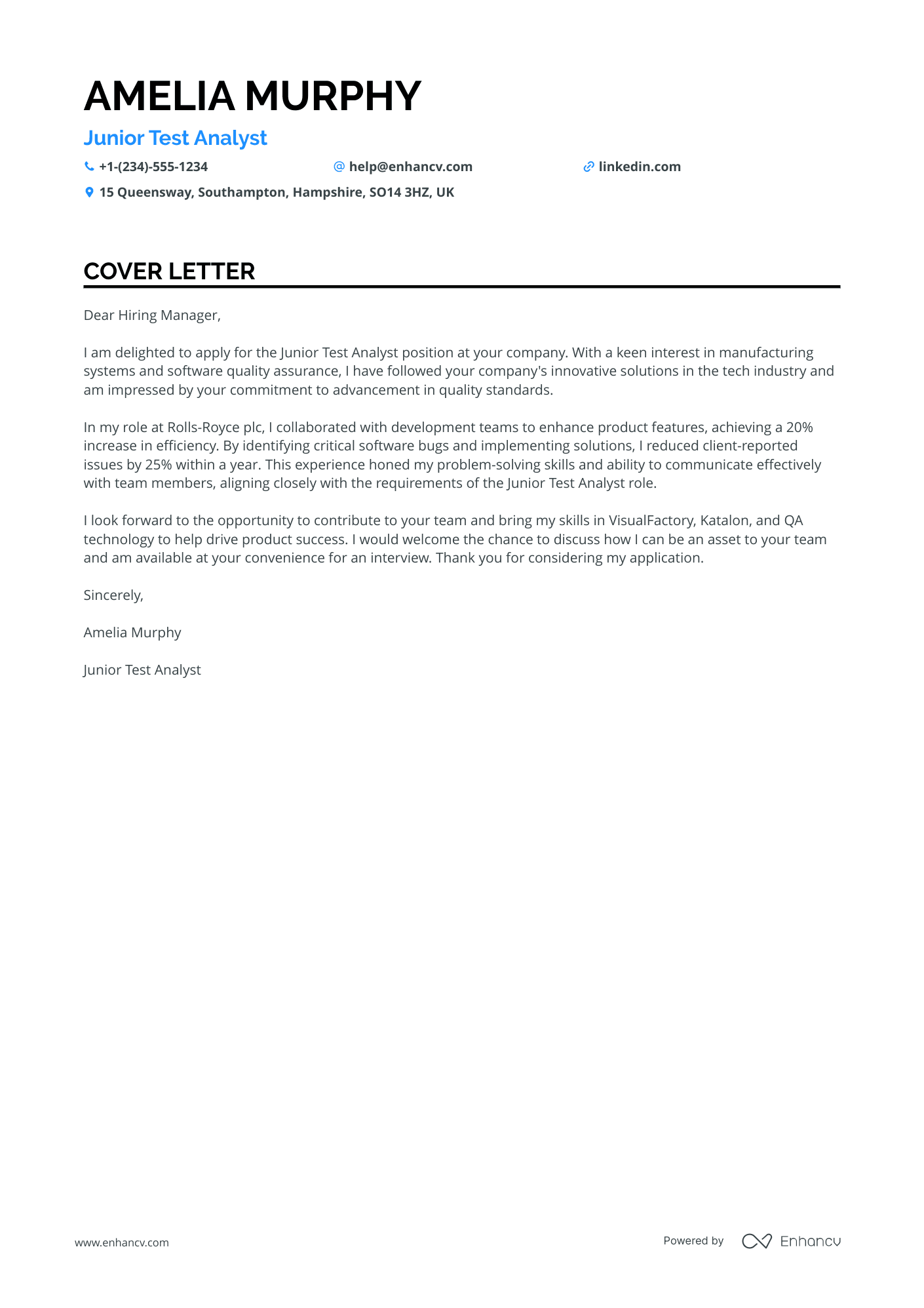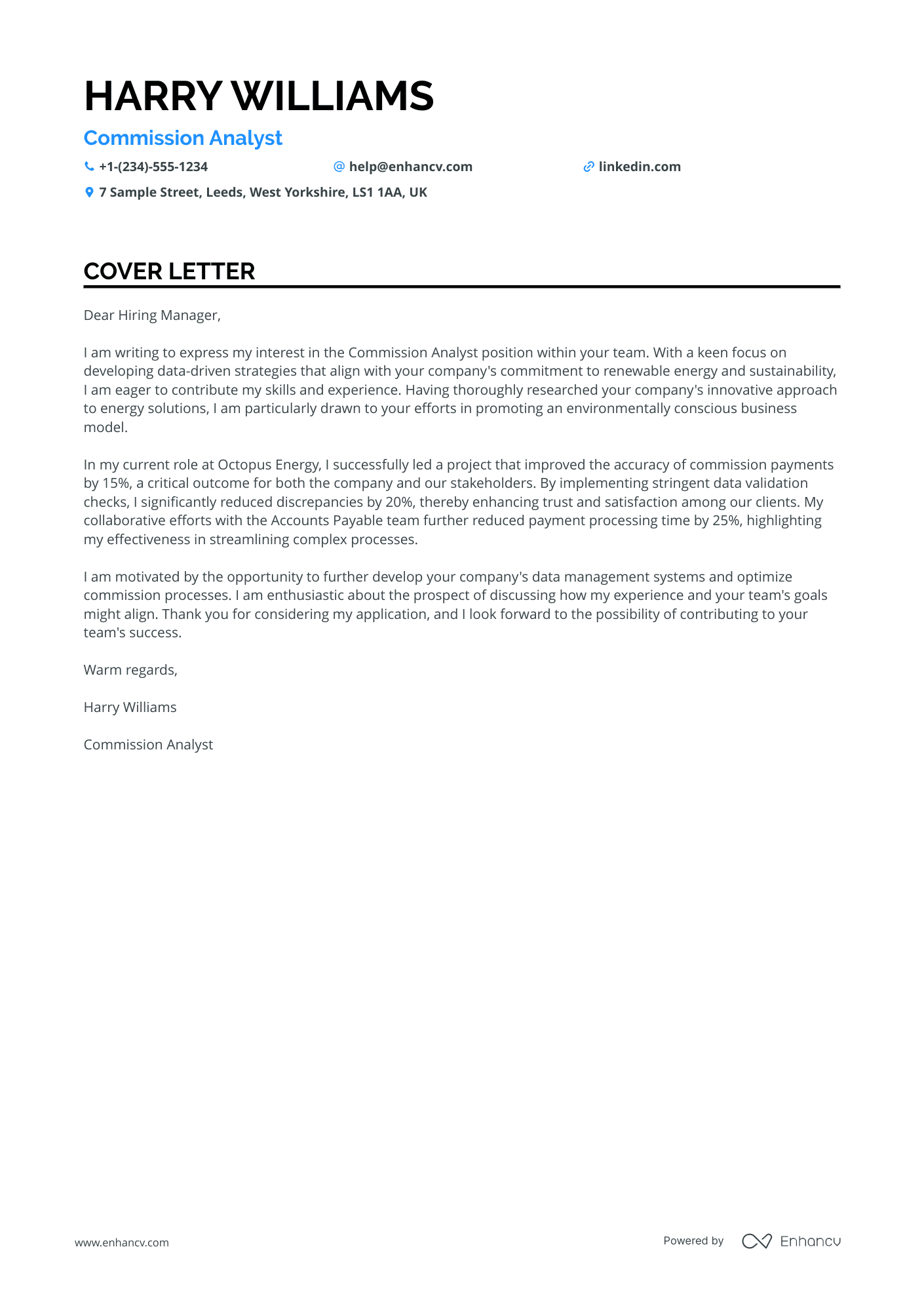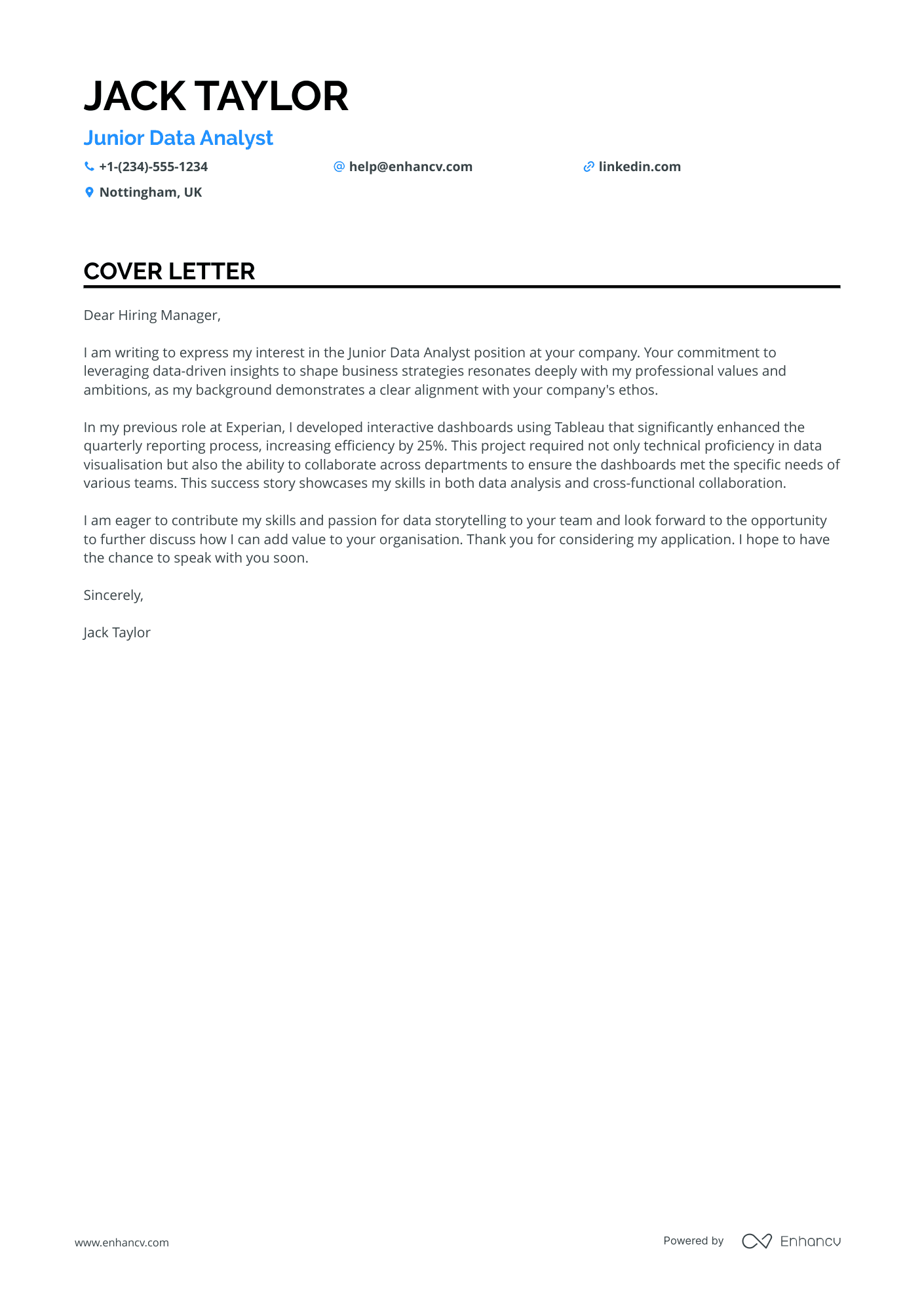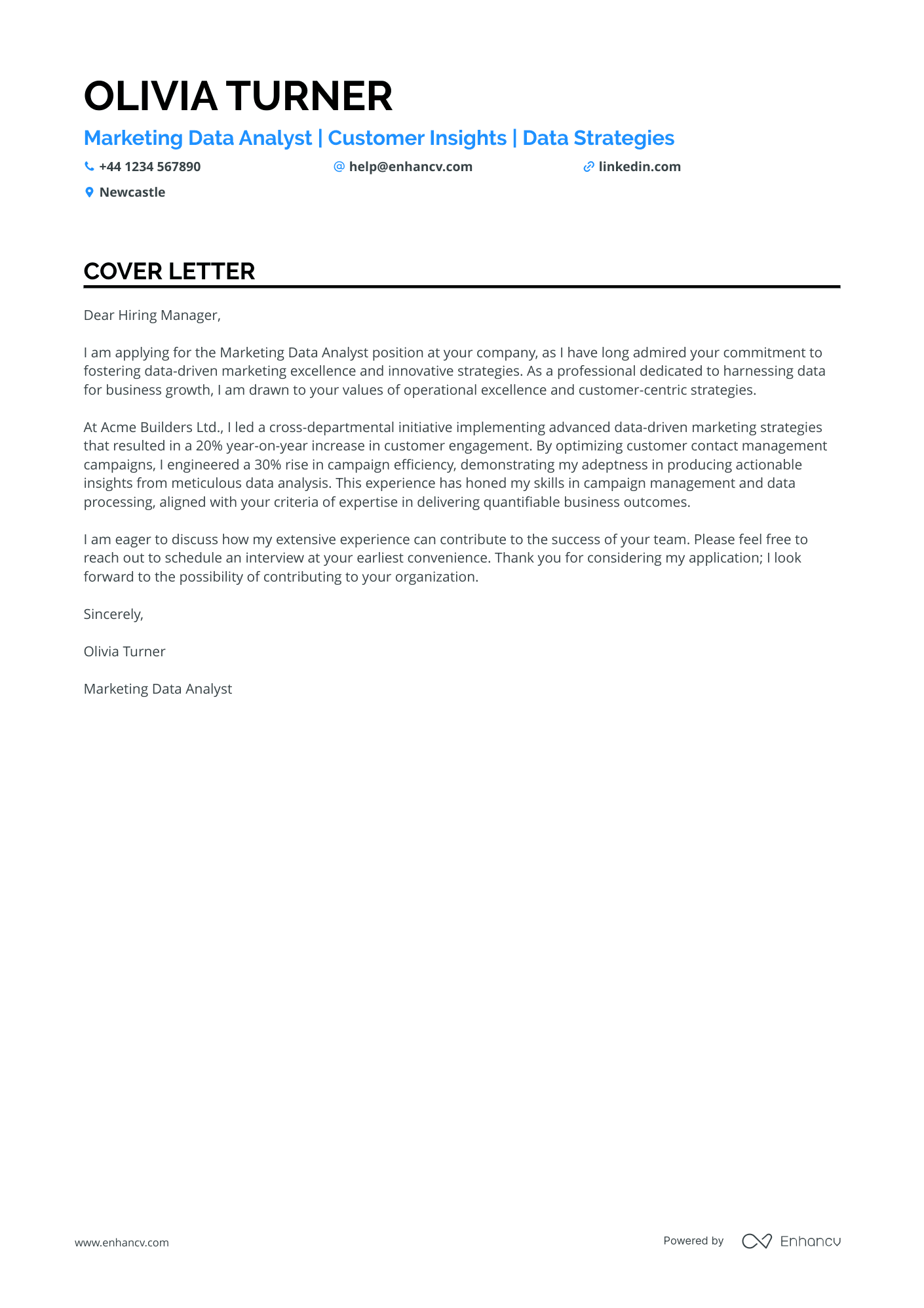Congratulations on completing your first cover letter. However, as you look back, you realise it’s simply a copy-paste of your CV.
Repeating your curriculum vitae is a common pitfall that many candidates encounter, making the cover letter redundant.
Your cover letter should provide fresh insights, adding more value to your application. It’s also the ideal space to address career gaps or major transitions that might not be covered in your CV.
In this guide, you’ll learn how to use your cover letter to demonstrate why you’re the best candidate for the role, while confidently addressing your career history and key achievements.
Cover letter examples for junior data analyst
By Experience
Entry-Level Junior Data Analyst
- Highlighting the efficiency improvements in data processing and problem-solving that resulted in quantifiable metrics, which demonstrate the candidate's ability to enhance productivity and effectiveness.
- Emphasising both education and continuous professional development, such as a Bachelor of Science in Data Science and knowledge gained from relevant courses like "Advanced SQL for Data Scientists", which indicates a commitment to maintaining and expanding expertise.
- Showcasing proficiency in key technical skills like SQL, Python, and data visualisation, which are essential for a Data Analyst role and underscore the candidate's ability to handle complex data-driven tasks.
- Mentioning the ability to communicate analysis results effectively, which is vital for stakeholder engagement and improving project outcomes, providing a competitive edge in collaborative environments.
Intermediate Junior Data Analyst
- Relevant Experience: Alice highlights her experience in API management and project execution, specifically mentioning the impact of her work, such as a 25% increase in customer satisfaction, which is crucial for a Technical Business Analyst role focused on e-commerce.
- Specific Achievements: The cover letter effectively lists quantifiable accomplishments, such as leading to a 30% increase in shipment options or improving tracking accuracy by 15%, demonstrating Alice's ability to make tangible improvements.
- Skills and Tools: The mention of skills like API Integration, Data Analysis, and tools such as Postman gives employers confidence in her technical capability to handle job-specific tasks.
- Education and Certifications: Listing relevant courses such as the 'Advanced API Testing with Postman' and her PMP certification showcases continuous learning and leadership skills valuable to the role of a Technical Business Analyst.
Advanced Junior Data Analyst
- Highlighting comprehensive experience in data governance and quality management helps establish credibility and proficiency, key components for a role focused on data integrity.
- Providing specific and quantifiable achievements, such as increasing data accuracy by 20% and enhancing reporting efficiency by 25%, strengthens the impact of contributions and aligns with the requirements of optimising data processes.
- Emphasising collaboration with cross-functional teams demonstrates a candidate's ability to work well with diverse groups, which is crucial for roles involving team collaboration and coordination.
- Showcasing a commitment to professional development through relevant courses, like 'Data Governance and Stewardship' and 'Advanced Excel for Data Analysis', reflects an ongoing pursuit of skills enhancement, essential for staying updated in the field.
Junior Data Analyst Trainee
- Quantifiable Achievements: The cover letter effectively highlights specific accomplishments with quantifiable impacts, such as improving operational efficiency by 25% and increasing data accuracy by 35%, showcasing the candidate's ability to deliver measurable results.
- Relevant Skills and Tools: Highlighting expertise in critical data analysis tools such as SQL, Python, and R, along with automation and data dashboard creation skills directly align with the requirements of a data analyst role, making the candidate a strong fit.
- Experience with Notable Firms: Mentioning work experience with reputable companies such as Capgemini and Deloitte adds credibility and indicates familiarity with high-standard environments.
- Continuous Learning and Development: Participation in courses like "Data Visualisation Using Power BI" and "Advanced SQL for Data Analysis" demonstrates a commitment to ongoing professional development and staying current with industry trends.
Junior Data Analyst Intern
- The cover letter effectively showcases relevant experience, such as leading data analysis projects and coordinating robotics clubs, which are aligned with analytical and problem-solving skills essential for a Junior Systems Data Analyst.
- Specific achievements like "Regional Coding Competition Champion" and developing a "Data Driven Machine Learning Model" highlight the candidate's capability to apply data skills successfully, demonstrating a track record of success.
- Mentioning a "Data Science Professional Certificate" completed through Harvard University adds significant weight, as it reinforces the candidate's formal education in key data analysis techniques critical for the role.
- The passion for coding and data science is crucially aligned with the FinTech industry, illustrating a genuine interest and drive to succeed within the field, enhancing credibility and cultural fit.
Junior Data Analyst Associate
- Certifications and Courses: Highlighting certifications such as the "Advanced Data Analytics Certification" and "Cybersecurity Analytics Course" showcases specialised knowledge applicable to the role.
- Quantifiable Achievements: Emphasising improvements like the 30% increase in data accuracy and efficiency illustrates the candidate's ability to deliver tangible results.
- Relevant Experience: Describing specific projects and accomplishments, such as leading a data management project or developing data dashboards at KPMG, provides evidence of applicable experience in data and analytics.
- Technical Skills: Mentioning skills such as R programming, SQL, and Tableau demonstrates technical expertise necessary for a technology-focused analytics position.
By Industry
Junior Data Analyst in Financial Services
- Highlighting relevant experience: The cover letter effectively showcases Scarlett Murphy's current role at Sky Group, emphasizing her experience in financial analysis, data integration, and improving forecasting accuracy. This aligns well with the requirements of a Junior Financial Analyst.
- Emphasising certifications: Mentioning certifications such as "Data Analysis with Excel" and "Financial Modelling & Valuation Analyst" demonstrates continuous professional development, crucial for a role that requires specialised financial skills.
- Showcasing achievements: Including specific achievements, such as the reduction of budget variances and the development of automated reporting systems, provides concrete evidence of Scarlett's abilities and contributions in previous roles.
- Focus on cross-functional collaboration: The cover letter highlights Scarlett's experience working with cross-functional teams, which is important for a financial analyst role that requires collaboration with various departments.
Junior Data Analyst in Healthcare
- Emphasis on experience in healthcare analytics and value-based care, which aligns with the role of a Data Analyst in Health Analytics.
- Inclusion of quantitative achievements, such as a 30% improvement in efficiency metrics and a 15% decrease in patient follow-up delays, to demonstrate effectiveness and impact.
- Mention of collaboration with multidisciplinary teams, which is crucial for roles involving healthcare systems where cross-functional teamwork is essential.
- Showcasing a continuous learning attitude through completed courses in "Advanced Health Data Analysis" and "SQL for Data Science", indicating commitment to skill enhancement relevant to the field.
Junior Data Analyst in Marketing
- Emphasising Quantifiable Achievements: The cover letter effectively highlights Freya's quantifiable achievements, such as a 20% increase in client acquisition and a 15% rise in month-on-month sales growth, which demonstrates her impact and drives her credibility as a Market Research Specialist.
- Relevant Experience and Skills Alignment: Freya strategically lists her experience and skills like Market Research, Data Analysis, and Forecasting, which directly align with the core functions of a Market Research Specialist role, thus underlining her fit for the position.
- Industry-Specific Expertise: Focusing on her experience in the fertility market, Freya shows niche expertise and insight into a specific industry, which can be advantageous for companies looking for specialised market research professionals.
- Commitment to Professional Development: The inclusion of relevant courses such as "Advanced Statistical Analysis for Business" signals Freya's commitment to ongoing learning and staying updated with industry trends and techniques, a quality highly desirable in data-driven roles.
Junior Data Analyst in Retail
- Emphasis on Skills: The cover letter highlights key skills relevant to a Data Analyst role, such as Python, Azure, spaCy NLP, and BERT, which are essential in AI and Machine Learning contexts.
- Project Achievements: Specific achievements, such as improving client sales predictions accuracy by 25% and data access efficiency by 30%, demonstrate the candidate's ability to deliver tangible results.
- Certification and Courses: Mentioning certifications like the Advanced Machine Learning Specialisation from Coursera emphasises commitment to ongoing professional development in specialised fields.
- Leadership and Stakeholder Engagement: Highlighting leadership in managing junior analysts and increasing stakeholder engagement by 35% through effective data visualisation showcases strong communication skills.
Junior Data Analyst in Logistics
- Emphasising Certifications: Mentioning certifications such as the IATA Dangerous Goods Regulations Certification highlights specialised knowledge crucial for a Logistics Analyst, especially in managing hazardous materials.
- Quantifiable Achievements: Providing specific metrics, like reducing operational costs by 15%, supports claims of effectiveness and impact in logistics roles, demonstrating success in applying knowledge and skills.
- Passion for Industry Innovation: Expressing a commitment to healthcare logistics innovation not only shows industry relevance but also aligns personal interests with professional goals, appealing to potential employers in the sector.
- Highlighting Cross-Functional Collaboration: Describing past collaboration efforts with various departments underlines the candidate’s ability to work with different teams, a key skill in streamlining and optimising logistics processes.
Junior Data Analyst in Human Resources
- Highlight relevant experience: The cover letter effectively showcases Isla's experience in human resources with specific achievements, such as streamlining onboarding processes and leading I9 audits, demonstrating her ability to improve efficiency and ensure compliance.
- Certifications and education: The inclusion of certifications like "HR Management with CIPD" and an academic background in Human Resource Management from a reputable university establishes her qualifications and commitment to professional development.
- Skills and competencies: Emphasising skills such as employee relations, payroll processing, and compliance with HR laws highlights her comprehensive HR expertise, making her a strong candidate for an HR Analyst position.
- Passion for the role: Expressing a passion for employee well-being initiatives and HR technology shifts adds a personal touch to the letter, showing genuine interest in contributing to organisational growth and employee satisfaction.
Junior Data Analyst in IT
- Relevance of Experience: Freya has tailored her cover letter to highlight her experience in data management and analysis, linking her past roles directly with the advertised position. This approach makes it easy for hiring managers to understand how her previous work translates to immediate value.
- Quantifiable Achievements: The cover letter includes specific numbers to substantiate her accomplishments, such as a 30% improvement in data accessibility and a 15% increase in operational efficiency. This provides concrete evidence of her capabilities and effectiveness in previous roles.
- Continuous Learning: Listing relevant courses such as "SQL for Data Science" and "Advanced Data Visualisation" signals a commitment to professional development, which is crucial in a field that evolves as rapidly as data science.
- Passion for Education: Freya aligns her professional goals with her passion, such as advocating for educational equality. This not only shows personal motivation but also indicates that she is likely to be highly engaged and driven to succeed in roles focusing on educational outcomes.
Junior Data Analyst in Real Estate
- The cover letter effectively highlights the candidate's proficiency in financial modelling and valuation, crucial skills for a role in real estate analysis, supported by specific software expertise such as Excel and Argus.
- The candidate underscores their successful track record of improving property value assessments and client investment strategies, providing quantifiable results such as a 25% optimisation and a £500,000 valuation increase.
- An active emphasis on client engagement and satisfaction is evident, illustrated by a consistent 95% stakeholder satisfaction rating and the ability to gather data through direct meetings, identifying this as a critical strength in client relations.
- The cover letter highlights the candidate's continuous professional development, referencing advanced courses and certifications like the Advanced Real Estate Financial Modelling and Argus Software Training, demonstrating commitment to staying updated with industry-specific knowledge.
Junior Data Analyst in Non-profit
- Highlighting Relevant Skills: The cover letter effectively showcases expertise in essential tools like Tableau and Python, signalling proficiency in data visualisation and analysis, which are crucial for a Junior Data Analyst role.
- Demonstrating Impact Through Metrics: Describing achievements, such as a 25% increase in client satisfaction and a 30% improvement in forecasting accuracy, demonstrates the candidate’s ability to deliver data-driven results.
- Emphasising Experience in Process Optimisation: The mention of implementing Lean methodologies and reducing operational costs by 15% highlights the candidate's capability in process efficiency and continuous improvement, valuable for any analytics team.
- Showcasing Educational and Professional Development: Mentioning courses and certifications like "Tableau Specialist Certification" illustrates a commitment to ongoing learning and skills enhancement, which is beneficial for professional growth in the data analysis domain.
Junior Data Analyst in Education
- Quantifiable Achievements: The cover letter effectively uses quantifiable achievements (e.g., improving accuracy by 30%, reducing manual effort by 25%) to demonstrate impact in previous roles, highlighting the candidate's ability to deliver tangible results.
- Relevant Technical Skills: Including expertise in SQL, R scripting, and database management aligns well with the technical requirements of a data analyst role, demonstrating capability in key areas that are crucial for data analysis tasks.
- Cross-Functional Collaboration: Emphasising collaboration with cross-functional teams highlights the applicant's ability to work effectively in diverse team settings, which is valuable for integrating data insights into broader business strategies.
- Continuous Learning: Mentioning completed courses such as "Data Analysis with R" conveys a commitment to ongoing education and skill enhancement, an important trait for staying current in the fast-evolving field of data analytics.
Junior Data Analyst in Telecommunications
- Relevant Experience Highlighted: The cover letter effectively showcases the applicant's relevant experience at Deloitte and KPMG, emphasising achievements such as a 25% increase in sales forecasting accuracy and a £50,000 annual saving through process optimisation.
- Skills and Tools Emphasised: Key skills pertinent to a Junior Analyst role, like Power BI, Python, and SQL, are prominently featured, alongside significant achievements that demonstrate proficiency in these areas.
- Education and Courses: The candidate underscores their formal education with a Bachelor of Science in Data Science and supplements this with relevant courses such as Advanced Data Visualisation with Power BI, enhancing their credibility for data-related tasks.
- Achievements Related to Job Role: The applicant discusses strategic achievements related to data analysis and market forecasts, framing them as directly beneficial for boosting operational efficiency and decision-making processes within a business context.
Junior Data Analyst in Manufacturing
- Highlight relevant certifications such as the Certified Tester Foundation Level (CTFL) and Advanced Test Analyst Training, which are crucial for establishing credibility and expertise in the Software QA field.
- Emphasise achievements in improving software functionality and efficiency, such as enhancing product features by 20% and boosting software stability by 35% to demonstrate impact and value to potential employers.
- Showcase problem-solving skills and bug identification proficiency, such as resolving critical software bugs that reduced client-reported issues by 25%, highlighting the candidate’s effectiveness in tackling challenges.
- Mention involvement in process improvement initiatives like streamlining automated testing processes to decrease test cycle time by 15%, illustrating an ability to contribute to continuous improvement and efficiency enhancement.
Junior Data Analyst in Energy
- Emphasise quantifiable achievements such as the 15% increase in payment accuracy and 20% reduction in commission discrepancies, showcasing the ability to deliver tangible improvements in processes.
- Highlight collaboration skills with cross-functional teams, as demonstrated through projects with accounts payable and supporting platform rollouts, indicating strong teamwork and influencing abilities.
- Showcase a thorough approach to problem-solving with specific tasks like conducting root cause analysis for payment issues, indicating a proactive mindset in addressing company challenges.
- Demonstrate passion and alignment with industry trends, such as the focus on renewable energy, which can be beneficial for roles within environmentally conscious companies like Octopus Energy.
Junior Data Analyst in Agriculture
- Emphasising technical skills such as Python and SQL is vital for a Junior Data Analyst, as they are key tools in data processing and analysis.
- Highlighting achievements like reducing data processing time by 30% shows a concrete impact and value to prospective employers.
- Mentioning specific experience with data visualisation tools like Tableau can be advantageous for roles focused on enhancing data comprehension through visual means.
- Detailing collaboration with cross-functional teams and involvement in workshops can demonstrate strong communication skills and the ability to work effectively in a team setting.
Junior Data Analyst cover letter example
Olivia Turner
Newcastle
+44 1234 567890
help@enhancv.com
- Highlight quantifiable achievements: Emphasize specific metrics and results, such as the 20% increase in customer engagement and 30% rise in campaign efficiency, to showcase data-driven success and impact in previous roles.
- Align with company values: Identify and reflect the company's values, like operational excellence and customer-centric strategies, to illustrate a mutual understanding and compatibility with the company's mission.
- Tailor skills to job requirements: Focus on skills relevant to the job description, such as expertise in campaign management and data processing, to demonstrate a strong alignment with the company's needs.
- Show enthusiasm: Express genuine interest and admiration for the company's achievements or philosophy, such as their commitment to innovative strategies, to convey motivation and excitement about the role.
Importance of cover letters in the United Kingdom
Cover letters are a vital part of professional job applications, helping shape recruiters' first impression of your profile.
Here’s why they’re important:
- Indicates your genuine interest: A well-researched cover letter reflects your knowledge of the company and role.
- Professionalism from the outset: Employers expect your cover letter to be structured, polite, and formal. If you wish to add a more personalised touch, be sure to address your recipient directly.
- Capture the recruiters' attention: For most roles, candidates tend to have rather similar experience, which is why you should use your cover letter to explain what is unique about your profile.
What UK employers expect from a cover letter
Your UK employers will appreciate your application if you've taken the effort to tailor your cover letter to their job requirements.
Here’s how to ensure yours ticks all the right boxes:
- Research the company thoroughly: It's not enough to have only read the job advert. Look into the company's history, products, services, and recent achievements to demonstrate your genuine interest and knowledge.
- Connect with the company’s values: Every company has core principles that shape its culture and operations. Identify these values and use your cover letter to show how they align with your professional conduct and ethics.
- Emphasise your relevant skills: Highlight specific skills that match the job description and are most in demand. Use examples from your previous experience to support your claims and set yourself apart from other candidates.
How to format a junior data analyst cover letter
To get your cover letter's formatting right:
- Use a modern font like Lato, Raleway, or Chivo, rather than the overused Arial or Times New Roman.
- Set your cover letter to be single-spaced with 1-inch (2.5 cm) margins on all sides—our templates are automatically set up for you.
- Ensure both your CV and cover letter are consistent in font style and formatting.
- Always send your cover letter as a PDF to prevent alterations and preserve its layout.
When it comes to structuring your cover letter, follow this sequence: begin with your address and contact details, then the employer's details (i.e. name and address), and the date. Next, start with a personalised greeting, followed by your introductory, body, and closing paragraphs. Be sure to include a sign-off and your signature at the end.
Remember, although Applicant Tracking Systems (ATS) software, which may scan your CV for keywords, won't read your cover letter, it will be reviewed by recruiters.
How to write your junior data analyst cover letter salutation
Now it's time to make it personal—in your cover letter greeting, you should always address the hiring manager directly. Whenever possible, use their name, depending on how well you know them (e.g., 'Dear Mr Smith', 'Dear Abbie').
You can find their name by searching on LinkedIn (start by looking for the job posting and the recruiter), visiting the 'About' page of the company's website, or by calling reception or administration to enquire.
How to write your junior data analyst cover letter intro
It's never a bad time to show enthusiasm about the role, company, or team in your cover letter introduction.
Begin by sharing one or two aspects that genuinely excite you about the position—whether it's the company culture, specific responsibilities, or the team's past achievements.
Your enthusiasm demonstrates that you'll bring a strong work ethic, are eager to contribute, and are motivated to succeed.
How to write your junior data analyst cover letter body
As you reach the body of your cover letter, you might wonder what to write in it.
Our advice? Don’t just copy your CV—choose your greatest achievement and tell its story.
Focus on how you got there using hard and soft skills, describe your involvement, and quantify the results with concrete outcomes.
Remember, recruiters aren’t looking for an epic tale of your career—they want something concise, relevant, and directly addressing their needs.
How to write a closing paragraph
When ending your cover letter, you have two options:
Option one is to promise how you’d contribute to the organisation—whether that’s improving a target or achieving a specific goal—or how the company could help you grow professionally. Always emphasise the tangible impact you can deliver.
The second option is to close by asking when you can expect to hear back from the hiring managers, whether for an update or to arrange an interview.
Conclusion
A standout cover letter is crucial for making an strong impression in your job search in the UK market. Personalise your letter by addressing it to the hiring manager and aligning your skills with the job description.
Use concrete examples to highlight your greatest achievement and convey your enthusiasm for the position. Finally, ensure that both your cover letter and CV are presented professionally for a consistent application.
